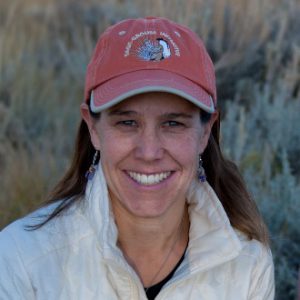President’s Message
Fall 2017
Message from the President, Holly Copeland
Have you noticed that change and uncertainty seem to be the dominant themes of the last several months? In the political world, the administration, sadly, appears to be undoing many key environmental policies, such as the possible roll-back of the BLM sage-grouse plans. The sage-grouse plans were the product of roughly 10 years of collaboration among industry, citizens, conservation groups, and state and federal agencies. In our physical environment, more frequent and intense hurricanes and floods, probably due to a changing climate, have introduced chaos and uncertainty into the lives of millions.
How do we remain steadfast and grounded in purpose when the ground beneath our feet is shaky and uncertain? I would argue that we first need to take care of ourselves, our homes, and our families by eating nourishing, healthy and local food, celebrating our connection to nature through fresh air and exercise, and nurturing our personal relationships through quality time together (put down that phone and talk to someone face to face!). However small or simple your home, take care of the place you reside and put yourself and your house in order. Once centered and grounded internally and in our immediate environment, we have the focus that’s required to face the external, uncertain world and impart our positive change and influence.
And speaking of change, the University of Wyoming hosted a forum on wind energy on October 2-3. The forum was well-attended with over 200 participants in person and an additional 200 online. I felt fortunate to attend and learned a lot about the ongoing shift from fossil fuels to clean energy sources. I was fascinated to learn that this shift is already well underway nationally and that currently, 40% of US electricity is generated from non-fossil fuel sources (solar, wind, hydro, nuclear). More is coming – Wyoming has over 8000 megawatts of proposed wind projects (5 times current levels). The footprint of these proposed projects is vast – approximately 800,000 acres. Wyoming’s biologists will be needed to help guide the siting and implementation of these projects to ensure that impacts to wildlife are minimized.
An excellent way to keep up with the latest trends in development and wildlife science is to attend conferences, such as the upcoming Wyoming TWS annual conference in Jackson December 7-9th. President-elect Ben Wise, and many on the board are working hard to ensure that this conference lives up to its reputation as the best and most important gathering of wildlife professionals in Wyoming. Please register soon (link to registration here) and attend! We look forward to seeing you in December!
Holly Co peland is a conservation scientist and spatial ecologist with The Nature Conservancy, Wyoming Chapter. Her research has focused on a range of Western conservation issues, such as ungulate migration, forecasting impacts of development on wildlife, and evaluating wetland and riparian health.
peland is a conservation scientist and spatial ecologist with The Nature Conservancy, Wyoming Chapter. Her research has focused on a range of Western conservation issues, such as ungulate migration, forecasting impacts of development on wildlife, and evaluating wetland and riparian health.


